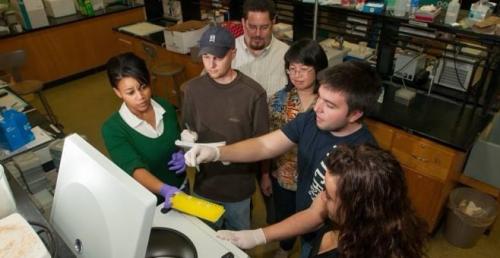WIU Alumnus Part of Research and Development of Pfizer's COVID Vaccine
March 3, 2021

WIU alumnus Ben Boda (brown shirt) working in the Musser Lab at WIU as a graduate student.
[Download Print-Quality Image]
MACOMB, IL – An excellent resource for students in the classrooms of Western Illinois University is the opportunity to learn from those who have gone before them.
This week, students in WIU's Department of Biological Sciences had the opportunity to learn from an alumnus who was part of developing the COVID-19 vaccine for the Pfizer company. Ben Boda, who received his bachelor's degree in biology in 2006 and his master's degree in biology in 2012, works in Pfizer's research and development division in Chesterfield, MO.
While there are aspects of his participation in the vaccine development Boda can't talk about for confidentiality reasons, this week he talked with about 40 biology students about how his time at Western led him to work for the vaccine developer. While on campus, Boda worked in Professor Richard Musser's laboratory, conducting research on plants and caterpillars. His master's research centered on tomato plants and white flies.
"We bonded over our love of nature," said Musser. "It was a real family-like atmosphere at times and Ben was a big part of that."
While at WIU, Boda completed an internship with the National Corn-to-Ethanol Research Center in Edwardsville, IL. After graduating with his master's degree, Boda went on to work at Sigma-Aldrich in St. Louis, MO, working with Active Pharmaceutical Ingredients (API). He began working for Pfizer in late 2012 in biological research and development.
"Ninety percent of the things we work on no one ever hears about and it never goes to market," he said. "It's rewarding, but very challenging."
Boda said he worked on making plasma DNA for the COVID vaccine, which is the spike protein that makes the COVID virus recognizable to the human immune system. Phizer's vaccine development includes phases completed at three of its sites, including where Boda works, and in Michigan and Massachusetts. He stressed how it took an "army of people" to figure out the successful vaccine.
"The fastest a vaccine was ready previously was five to six years," he said. "This took eight months."
The vaccine production process began at the Chesterfield facility, where Boda said sections of DNA, called plasmids, are created and then run through a purification process to produce microscopic DNA loops. Those loops are then straightened, packed in bags, frozen and quality-checked, before being shipping to the company's Andover, MA facility to continue the production process.
In addition to talking students about his work with the vaccine, Boda offered them advice for job searches and answered questions about his career and lab work.
"The knowledge and lab skills I obtained at WIU helped me throughout my career," he said.
For more information about WIU's Department of Biological Sciences, visit wiu.edu/biology.
Posted By: Jodi Pospeschil (JK-Pospeschil@wiu.edu)
Office of University Communications & Marketing

Connect with us: